| Fredric March
(Anna Karenina)

- by Néstor G. Acevedo (Greg) - |
|
INTRODUCTION |
One of the most respected, and distinguished actors in the history of Hollywood. March, with two Academy Awards, for 1932, Dr Jekyll and Mr. Hyde, and The Best Years of Our Lives 1946. Fredric March was born, Ernest Frederick McIntyre Bickel, in Racine, Wisconsin, on August 31 1897. He became a stage star in the 20s, marrying in 1927 and often acting with Florence Eldridge. March appeared opposite most of the glamorous women stars of the early 30s cinema, Garbo, Crawford, Loy, Lombard, Gaynor, among others. He was one of the first actors of the 30s who made Technicolor films.
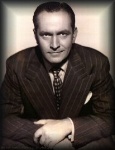
As his reputation grew, and he re-created his stage success imitating John Barrymore in, The Royal Family of Broadway. His brilliant double performance in Rouben Mamoulian's Dr. Jekyll and Mr. Hide won him a deserved Oscar and increased his prestige both as an actor and a matinée idol. Cecil B. De Mille cast him as the Roman centurion lead in The Sign of the Cross. He was one of the first stage actors to be brought to Hollywood when the sound arrived, and continuing at a high level up to 1973.

He made more than sixty six (66) pictures in all genres, from comedy to horror, including Swashbucklers, epics, romances, and heavy drama. John Ford cast him as Bothwell, in Mary of Scotland with Katherine Hepburn, He starred opposite Carol Lombard in the hilarious Ben Hecht satire in Technicolor, Nothing Sacred in 1937. Cecil B. De Mille again cast him the lead of the spectacular, The Buccaneer in 1938. Fredric March, as many of his performances were, he never really had the charisma of a major movie star; like all good stage actors, he lost his personality in his roles, and probably for this reason, never created a recognizable screen image, the only characteristics he carried with him from film to film were his intelligence and his prestige. Anna Karenina (1935) with the great Greta Garbo, was the peak of his 30s career, starring in one great film after another.
ANNA KARENINA |
Anna Karenina (USA 1935), in which Garbo worked for Clarence Brown. This time the director sensed Garbo's mysterious appeal and independence and let her act as she saw fit. He even thought she had the makings of another Sarah Bernhardt, “if she would work at her technique, the eyes told it all”, Brown said. The director Clarence Brown also said, “her face wouldn't change, but on the screen it would be transition from love to hate”.
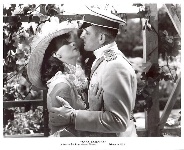
The critics saw in Garbo's second Anna (her first was in the silent film Love) new dimensions, a new tenderness and maturity. In the film reviews at the time, they wrote: “she has suddenly and precisely passed out of her twenties. This quality of gentleness, a gift usually of women over fifty, in an overwhelming thing when it goes with the appearance of a beautiful woman of thirty.”
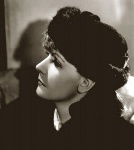
Garbo has been informed of Fredric reputation as a womanizer, so the love scenes were few and restrained, noticed that when he put any vigor into his embraces, as a deterrent to romantic advances, Garbo munched on garlic before playing love scenes. It worked. March found her to be a healthy, vital girl, and not always as reserved as he had been led to believe. He also noticed her sense of humor.

Fredric March didn't want to do Anna Karenina, he said, that he only do the film if he is forced to by his employers, Twentieth Century Pictures, which had contract with him, He has told producer David O. Selznick repeatedly that he is fed up on doing costume films, that he thinks it a mistake to do another. One day, after March's angles were completed, he started for his dressing room, and then decided to watch Garbo working on her own close-up. Impressed by her technique, he walked over to her and complimented her on it, “Do you mean you watched me acting?” she asked, “Why, yes-“ “You should not have done that,” said Garbo as she walked off in a huff to her dressing-room.

MORE ON ANNA KARENINA PRODUCTION |
The largest ballroom ever made for a movie. Adrian designed white ball gowns, and hooded furs for Garbo, Selznick enlisted Erich von Stroheim and Andrey Tolstoy as technical advisers, Stroheim for military details, and Tolstoy for the legitimacy his name would lend to the production of his distant relative's masterpiece. Garbo did not get her first choice of director, George Cukor, who bowed out after reading the screenplay, which he pronounced boring. She surprised no one, by calling in Clarence Brown as his replacement. The film focuses only on the novel's personal tragedy, but it does so well enough, even as compromised by censorship regulations that forbade “adultery without remorse.”
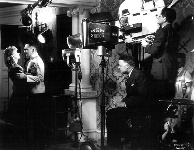
By Production Code standards, even Anna's suicide on the train tracks did not show sufficient contrition, because she had willingly left her husband, to enjoy herself with Vronsky. Though Selznick knew he had some strong performances, and sumptuous setting, he still worried that the film would fail, and was convinced that its most promising box-office lure was little Freddie Bartholomew, the lovable David Copperfield, who's Anna's son has some touching scenes with Garbo. Even Fredric March, who played Count Vronsky, and was never quite charmed by Garbo, conceded that she “Had a wonderful way with all children”.
Anna Karenina, opened in September of 1935, Garbo was vindicated. The film was a success, and Garbo won the New York Film Critic Award for Best Actress.
MARCH ABOUT GARBO |
The actor admitted that he really never got to know Garbo too well. He misunderstood her preference for addressing him as “Mister March”. Even when making small talk about March's trip to Tahiti, the distance was there. “She was always so afraid, shy, everything bothered her,” he said.
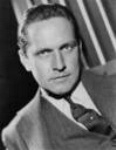
After observing her in a particularly poignant scene, the actor offered his congratulations. “he looked at me, 'you were looking, Mr. March?' yes, Miss Garbo! 'really you were looking at me, Mr. March?' But yes, Miss Garbo”! ‘Please you should not look at me, Mr. March, It is embarrassing.' She had many complex, poor dear”, March once said.
After Garbo was friendlier to him, once he agreed to her ground rules. March later said: “we would bounce a medicine ball back and forth, and one day she stripped to the waist to take the sun. Then she caught herself and asked if it embarrassed me, it did not. I was not overwhelmed by Garbo's beauty, I think that at the time woman were more attracted to her than men," Fredric recalled. Fredric March didn't found the film, or Garbo, enchanting.
MORE ON FREDRIC MARCH |
Fredric March once wrote: “To me characterization is the whole fun of acting, every part is a character part”. This statement nicely sums up his attitude to acting, and in the course of more than forty years in films, he appeared in a wide variety of roles. March in the mid- forties was getting old for to be a romantic hero, but he soon back in major films like René Clair's, I married a Witch, with Veronica Lake, The Best Years of our Life with Myrna Loy, for which he won The Academy Award, sensitively portraying the oldest of the three returning veterans and winning his second acting Oscar.
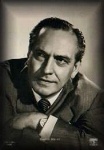
Then, The Adventures of Mark Twain (with lots of make-up). He moved definitely to older roles. He was memorable as the older man in love with Kim Novak, in the film version of Paddy Chayefsky's The Middle of the Night, in 1958. He rounded off his career beautifully, playing in the 1973 American Film Theatre Production of O'Neill's The Iceman Cometh, as the owner of the last chance saloon; it was a perfect combination of theatre and Cinema that reflect his own best work. He died in 1975 at age 78.
|
|
|
SOURCES
Conversations with Greta Garbo - Sven Broman
Walking with Garbo: Recollections and conversations - Raymond Daum/ Vance Muse
Movie Stars and their Films - Ken Wlaschin
|
| |
| |